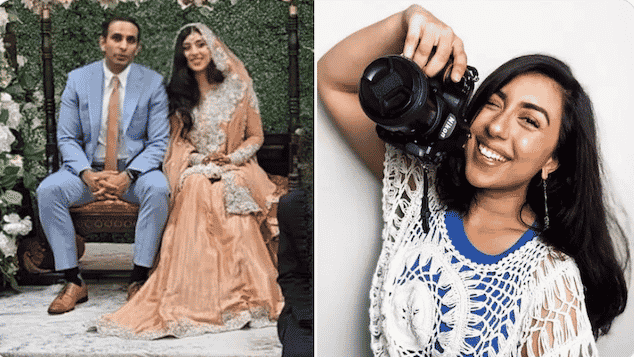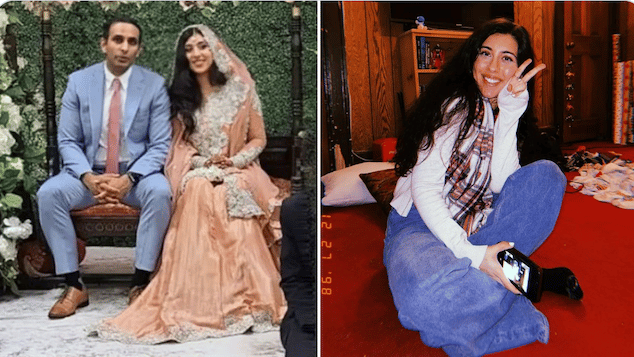

Sania Khan Pakistani American photographer shot dead by ex husband then self at Chicago residence after sharing details of divorce on TikTok. The stigma of divorce and the plight of first generation South Asian women seeking independence and self empowerment.
A South Asian woman’s musings on social media about the breakdown of her marriage and the resultant stigma led to her former husband traveling to Chicago and shooting her dead then self in an apparent murder suicide.
Sania Khan, a Pakistani American photographer who had recently moved to Chicago, was allegedly shot and killed by her ex-husband, Raheel Ahmed, 36, who had traveled more than 700 miles from Alpharetta, Georgia — a suburb of Atlanta – to Khan’s residence the Chicago Sun-Times reported.
According to her website, Khan, 29, was a professional photographer who moved to Chicago in June 2021.
Officers arrived Monday afternoon at the 200 block of E. Ohio street to perform a welfare check at the behest of the man’s family where they found the former couple with gunshot wounds to their heads inside a residence.
Khan was pronounced dead on the scene, while Ahmed was transported to Northwestern Hospital where he was pronounced dead. A weapon was recovered from the scene, police said.
A 29-year-old Pakistani American woman was killed in her own home by her ex-husband.
Before she was shot, Chicago-based photographer Sania Khan posted videos on TikTok about how difficult it was to divorce as a South Asian woman. pic.twitter.com/9O4lJjMaCY
— AJ+ (@ajplus) July 20, 2022
‘But what will people say?’
Sania Khan’s death was ruled a homicide, while Raheel Ahmed’s death was ruled a suicide ABC News reported citing police.
Cops were asked to perform a welfare check at Khan’s Chicago residence after concerned Alpharetta family reported the man missing and feared he may have gone to his former wife’s house after becoming aware of social media posts his former wife shared with her followers about the demise of their marriage.
According to social media posts Khan shared on TikTok, using the username ‘geminigirl_099,’ her marriage lasted less than a year before she filed for divorce.
Khan, a native of Chattanooga, Tennessee, and a first-generation child of Pakistani Muslim immigrant talked about her marital struggles on TikTok, her journey to finding empowerment and starting a new life along with the resultant pushback from her family who discouraged her from divorcing.
She urged women to ‘stop ignoring those red flags’ while discussing her struggles with her own family and some in the South Asian community, who did not support her decision to get a divorce.
‘Going through a divorce as a South Asian Woman feels like you failed at life sometimes,’ she wrote in one TikTok video. ‘The way the community labels you, the lack of emotional support you receive, and the pressure to stay with someone because ‘what will people say’ is isolating. It makes it harder for women to leave marriages that they shouldn’t have been in to begin with.’
In another video, Khan wrote that she was sitting in a coffee shop ‘getting lectured by family members’ after her TikTok video about her divorce journey went viral.
Save your daughters. Let them come home n live https://t.co/UwYMxVU5kw
— Samina Peerzada (@SaminaSays) July 21, 2022
Preserving family honor and domestic violence
‘Women are always expected to stay silent,’ she wrote. ‘It’s what keeps us in messed up situations in the first place. I’m done with this mentality.’
In a video on the eve of her 29th birthday, Khan showed off her first tattoo – “XXVIII” which is 28 in Roman numerals. She wrote that being 28 was the year that ‘changed f—— everything.’
‘The year I got married, the year I moved from a small town to one of the largest cities in the country, the year I filed for divorce, the year I almost died.’
News of Khan’s death has prompted conversations among South Asians in the U.S. about the ways in which their communities often stigmatize leaving marriages—even dangerous ones.
‘In South Asian communities, there’s this concept of saving face and preserving family honor—not bringing shame to the family. Those things are prioritized over an individual’s safety,’ says Neha Gill, executive director of Apna Ghar, a Chicago-based human rights organization that focuses on gender-based violence, particularly in South Asian communities in the U.S.
According to a study by the World Health Organization, instances of domestic violence increased globally during the COVID-19 pandemic.
In the U.S. more than 10 million adults experience domestic violence annually in the U.S., according to the National Coalition Against Domestic Violence.






